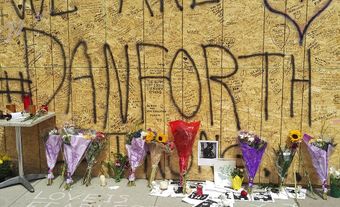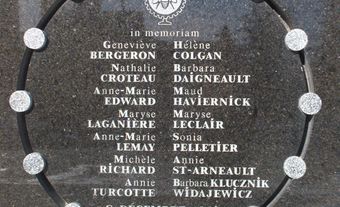At 1:24 p.m. on 23 April 2018, a 25-year-old man who identified as an incel (involuntary celibate), drove a rented van onto the sidewalk on Yonge Street in Toronto’s North York business district. He proceeded to drive south, intentionally running over pedestrians. When he was stopped by police 10 minutes later, 10 people (eight of them women) were dead and 16 injured. It was the biggest mass murder in Toronto history and the worst in Canada since the Montreal massacre in 1989. On 3 March 2021, the driver was found guilty of 10 counts of first-degree murder and 16 counts of attempted murder. His sentencing process is scheduled to begin on 11 January 2022.

The Attack
At 1:24 p.m. on Monday, 23 April 2018, a white Chevrolet cargo van jumped the curb on the southwest side of Toronto’s Yonge Street, at Finch Avenue. Pedestrians screamed and leaped out of the way as the van sped south along the sidewalk, swerving into people. Some people were run over; others were struck and flung into the air. At one point, the sidewalk narrowed, so the van crossed to the east side of Yonge Street and continued briefly down the sidewalk there. It then remounted the curb on the west side and proceeded south on the sidewalk, striking more pedestrians.
Toronto police officer Ken Lam arrived at the scene and confronted the van near Yonge Street at Sheppard Avenue. The driver stopped the van, got out, and walked toward the officer, pointing what looked like a handgun. The driver yelled for the officer to shoot him. Constable Lam saw that the object in the driver’s hand was a wallet, not a weapon, so he holstered his gun. He drew his nightstick and repeatedly ordered the driver to lay down on the sidewalk. The driver complied and was apprehended.
Victims
The horror had lasted 10 minutes as the van travelled 1.2 km down the busy sidewalk in Toronto’s North York business district. Sixteen people were injured in the attack. Ten people were killed: Munir Abdo Habib al-Najjar (85); Chul Min “Eddie” Kang (45); Anne Marie D’Amico (30); Dorothy Sewell (80); Beutis Renuka Amarasingha (55); Mary Elizabeth Forsyth (94); So He Chung (22); Andrea Bradden (33); Geraldine Brady (83); and Ji Hun Kim (22). All but Habib al-Najjar and Kang were women. Most of the 16 people who were injured were also women.
Investigation
There was never a doubt as to the crime’s perpetrator. In police questioning, the driver made no attempt to deny his guilt or that his crime was premeditated. He told police that he had decided to kill as many people as he could and rented the van three weeks before the incident. He had chosen that type of van because it would be small enough to be mobile but large enough to inflict maximum damage. When asked by investigators how he felt about having inflicted so much harm on so many people, he replied, “I feel like I accomplished my mission.”
Prior to the incident, the driver had posted a statement to his Facebook account, identifying himself as “Private (Recruit) Minassian Infantry 00010” and declaring “The Incel Rebellion has already begun!” The term “involuntary celibate” — or incel — was coined in 1993. The so-called incel movement began around 2010. It exists mostly online and is mainly composed of young men who believe they have been unfairly rejected by women. The driver’s Facebook post also sympathetically referenced another self-identified incel who killed six people and injured 14 others in a shooting, stabbing and vehicle-ramming rampage in Isla Vista, California, on 23 May 2014.
Perpetrator
The driver, Alek Minassian, lived in Richmond Hill. He attended Thornlea Secondary School and Seneca College, and enlisted in the military but was unable to complete the training process. He worked as a software developer but was between jobs at the time of the attack. The awkwardness he displayed in social interactions is akin to many of those diagnosed with Autism Spectrum Disorder (ASD).
Trial
The trial lasted eight weeks and concluded almost three years after the attack. On 3 March 2021, Ontario Superior Court justice Anne Molloy announced that the driver was guilty on all 26 counts: 10 counts of first-degree murder and 16 counts of attempted murder. Justice Malloy issued a 69-page document explaining her decision. In that report, Molloy rejected the defence’s argument that the driver was not criminally responsible for his actions because he had been diagnosed with autism. Molloy was convinced that the driver was fully aware of the consequences of his actions.
Molloy’s report stated that it was impossible for her to tell when the driver was telling the truth or lying, so it was equally impossible for her to discern his motive for the attack. Molloy wrote, “I am inclined to accept the assessment of all of the experts that Mr. Doe [Minassian] did lie to the police about much of the incel motivation he talked about and that the incel movement was not in fact a primary driving force behind the attack.”
However, following the attack, the driver was hailed as a hero in many online incel chatrooms. One poster on incel.me called the driver “our next new saint,” while another wrote, “Spread that name, speak of his sacrifice for our cause, worship him for he gave his life for our future.”
Sentencing
The killer was told on 31 May 2021 that his sentencing would be delayed. He was scheduled to appear in court on 11 January 2022 to receive his new sentencing date. The delay will allow the Supreme Court of Canada time to rule on a Quebec case, which will determine how long someone convicted of multiple murders can be ineligible for parole.
Legacy
The van attack was the biggest mass murder in Toronto history, and the worst in Canada since the Montreal massacre in 1989. (It has since been surpassed by the 2020 Nova Scotia Attacks, in which 22 people were killed.) The attack shined a light on the increasingly prevalent problem of male misogynistic violence. The trial also offered Canadians an opportunity to better understand mental health in general and autism in particular. Dr. Jessica Jones of Queen’s University noted that those with ASD, such as the driver, are often more uncomfortable and inelegant in social settings and are therefore more vulnerable to the influence of anti-social movements and ideologies such as incel. However, they are no more likely to be violent or to commit criminal acts than anyone else.
The van attack also cemented in the minds of many Canadians that an egregious act of premeditated mass violence could happen anywhere at anytime. (It was followed only three months later by the Toronto Danforth Shooting.)

 Share on Facebook
Share on Facebook Share on X
Share on X Share by Email
Share by Email Share on Google Classroom
Share on Google Classroom


